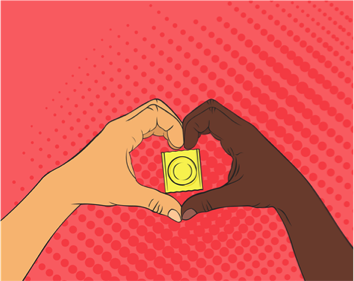
What are genital warts?
Genital warts are a common sexually transmitted infection passed on through skin to skin contact including vaginal and anal sex or sharing sex toys. They are caused by a virus called HPV (Human Papilloma Virus) many people carry the virus but never develop warts. Others can develop warts months or sometimes years after getting the virus. Genital warts are the second most common STI in the UK amongst people under 25.

Symptoms
A lot of people who have HPV get no symptoms at all, and the virus can gradually go away by itself. Other symptoms can include;
- Small, fleshy lumps or growths appearing on the penis, vagina or around the anus (bum).
- Several warts close together that take on a cauliflower shape.
- Itching or discomfort in your genital area.
- Bleeding when you have sex.

Treatment
Treatment depends on what your genital warts are like and what will work best for you. This is something that can we can talk about when you visit a Devon Sexual Health clinic . Treatment usually involves a cream or liquid that you apply yourself at home over several weeks. Some other treatment options are available if these don’t produce a response.
It can take weeks or months for treatment to work, and the warts may come back so you need to be patient. There’s no cure for genital warts but it’s likely your body will clear the virus over time.
There are over 100 types of HPV virus and these different viruses are responsible for all different sorts of warts that may occur anywhere on the body.
Some HPV variants can cause changes to cells that can sometimes lead to cancer. Cervical cancer and some genital and anal cancers are caused by these specific types of HPV virus. The types of HPV viruses that cause these cancers are not usually associated with benign (harmless) skin growths that look like warts; however it is important to seek help from a specialist clinic such as Devon Sexual Health if you notice any changes to your genital skin or symptoms that cause concern, such as abnormal vaginal bleeding.
There is a national immunisation programme in the UK where girls aged 12 – 13 are given HPV vaccinations at school to protect against these cancer causing HPV strains. This vaccination is also now being offered to men who have sex with men via sexual health clinics. This has been shown to dramatically reduce rates of cervical cancer.

What should I do?
The best thing to do is book an appointment at one of our clinics. The staff at our clinics are incredibly friendly and kind so there is no need to worry about visiting. They won’t judge you, but they will make you better. Waiting times can vary, so it is usually best to book an appointment in advance.
You may be advised to avoid sex until the warts have cleared up. This is mainly to protect the treated area of skin from friction and to help it heal. Using condoms may help to reduce the spread of the virus if they’re used while the warts are present and for the first three months after the warts have gone.
You may also find that your genitals are extra sensitive whilst having treatment so it’s best to avoid perfumed soaps or bubble baths during this time.

Avoidance
The most common way for HPV to be passed on is through skin to skin contact with an infected person so wear a condom during any sexual activity including vaginal, anal or oral sex. This isn’t 100% effective, but it’s the best way of avoiding an infection. Wash sex toys or cover them with a condom and replace it between partners. Also, talk to your partner about their sexual history. When did they last have unprotected sex? When did they last have a test for STIs?

